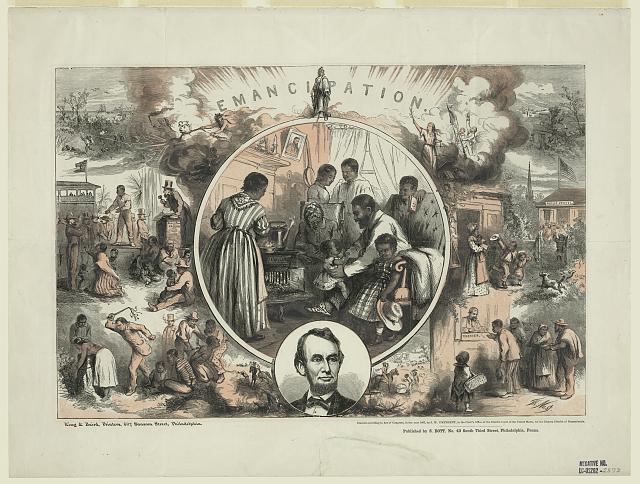Triumphs and Trials 1865-1900
1865 – On March 3, 1865, Congress passed “An Act to establish a Bureau for the Relief of Freedmen and Refugees” to provide food, shelter, clothing, medical services, and land to displaced Southerners and newly freed African Americans. Schools, churches, and communities grew throughout the NCA with the help, guidance and support of the Freedmen’s Bureau.
The 13th Amendment was ratified, abolishing slavery and involuntary servitude. This would be the first mention of slavery in the U.S Constitution.
Formerly built in 1848 as the home of the Armory Paymaster, Lockwood House served as a hospital to treat wounded Union soldiers. It was purchased by Freewill Baptist Missionaries to be used to educate formerly enslaved people. John Storer, a wealthy businessman from Maine, developed an interest in the school, matching $10,000 to the missionaries collected $10,000 through donations, assets and government funding. The school would become Storer College and grow to include three more buildings across Camp Hill in Harper’s Ferry.
1866 – On February 7, Frederick Douglass led a delegation of 13 representatives of the Colored Convention to the White House to meet with President Andrew Johnson. Their intent was to discuss the necessity for African Americans to be recognized as American citizens. The intent of the New England Convention in sending “a discreet, intelligent and refined delegation of colored men” to Washington was so they would have “great influence in creating due respect for the entire colored people” (LaRoche et al, 2021)
Located near the Antietam Battlefield, Tolson’s Chapel, a member church of Methodist Episcopal Church, like other Black churches served a dual purpose as a place of worship and learning during Reconstruction. The support displayed among African Americans shows throughout the period, as the land that was needed to build the church was provided by Samuel and Kate Craig. Support from the Freedman’s Bureau, benevolent societies and other Black Americans maintained the school well into the late 1890s.
Senator Charles Sumner encouraged legislators to enact a civil rights bill for African Americans over President Abraham Lincoln’s veto, but the Supreme Court promptly found this act to be unconstitutional.
On April 9, the Civil Rights Act of 1866 granted to Blacks the privileges and rights of American citizenship. The Act made systems of involuntary labor such as peonage or indenture that were being introduced to replace slavery illegal unless due to imprisonment and extended the rights of emancipated people by stating that any person born in the United States regardless of race is a US citizen and as such is entitled to equal treatment before the law.
The Ku Klux Klan, an organization formed to intimidate blacks and other ethnic and religious minorities, first met in Maxwell House, Memphis. The Klan was the first of many secret terrorist organizations organized in the South for the purpose of reestablishing white authority and denying rights of Black citizens.
Senate Bill 60, extending the life of the Freedmen’s Bureau and expanding its services, was vetoed by President Johnson.
1867 – On January 8, overriding President Johnson’s veto, Congress granted the Black citizens of the District of Columbia the right to vote. It wasn’t until Jan. 23, 1867, that the Maryland General Assembly outlawed “the sale of negroes into slavery as punishment for crime,” reported The New York Times. “There will hereafter be no distinction in the State in the mode of punishing white and black criminals,” according to the article.
1870 – The Fifteenth Amendment was ratified, a defining moment in granting voting suffrage for Black men. The Equal Rights League had been victorious in its long quest to achieve suffrage, “the crowning right of citizenship.”
The New Era newspaper was founded in Washington, DC. The newspaper was edited by J. Stella Martin. Frederick Douglass was its corresponding editor.
1872 – The first school in the Jefferson District of Arlington County opened for African Americans in the Convalescent Camp located in what is now the Army Navy Country Club. In 1872, a permanent schoolhouse was erected and was used until 1889, when it was replaced, on property in Johnson’s Hill.
First Baptist Church was established in Manassas, Prince William County, VA and is the oldest African American church in the county.
Founded in 1872, Rock Creek Baptist Church was the oldest congregation in Reno, where African Americans in surrounding communities regularly attended for church service. Aside from religious activities, Rock Creek Baptist Church organized pageants, lawn parties, picnics, and Sunday School trips to the Washington Zoo (Taylor, 2021).
1873 – V. Cook Nickens, a Leesburg, Loudoun County barber, became the first elected black official, serving for a year as a constable of Leesburg Magisterial District.
1879 – In Strauder v. West Virginia the US Supreme Court ruled that West Virginia had singled out Blacks and had “expressly denied by a statute all right to participate in the administration of the law, as jurors, because of their color, though they are citizens.” The West Virginia law which forbade Blacks from serving on juries was the first decision of the US Supreme Court to use the equal protection clause of the 14th Amendment to the Constitution to invalidate a state law. Taylor Strauder, a Black man convicted by an all-white jury of murdering a white woman, appealed to the Supreme Court alleging that the exclusion of people of color from juries violated his equal protection under the law. In its October 1879 decision, the US Supreme Court had found the West Virginia law forbidding Blacks from serving on juries to be unconstitutional.




